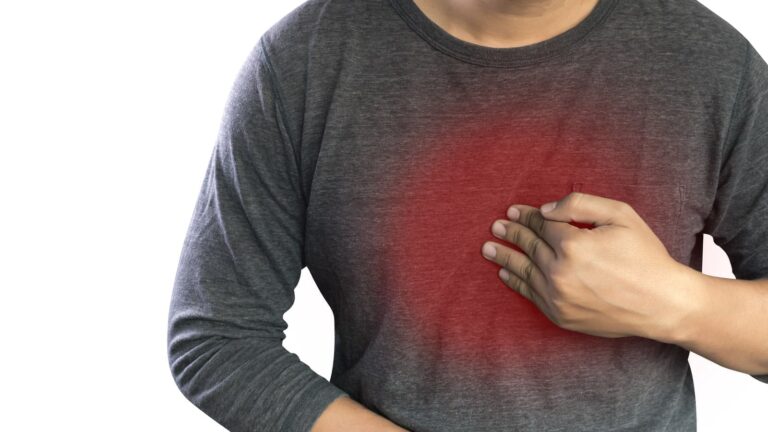WHAT IS HEARTBURN?
Heartburn is a burning pain in your chest, right behind your breastbone. The pain is usually worse after eating, in the evening, or when lying down or bending over.
Occasional heartburn is frequent and no cause for alarm. Most people could manage the discomfort of heartburn on their own with lifestyle changes and non-prescription medications.
Heartburn that is more frequent or interferes with your daily routine may be a symptom of a more severe condition that requires medical care.
HEARTBURN SYMPTOMS
Symptoms of heartburn include :
- Burning pain in the chest that generally occurs after eating and may occur at night
- Pain that becomes worse when lying down or bending over
- A bitter or acidic taste in your mouth
WHEN SHOULD YOU SEE A DOCTOR?
Chest pain can be one symptom of a heart attack. Seek help right away if you have severe chest pain or pressure, particularly when combined with pain in the arm or jaw or difficulty breathing.
Set up an appointment with your health care provider if :
- Heartburn happens more than twice a week
- Symptoms continue despite the use of non-prescription medications
- You have difficulty swallowing
- You have continuous nausea or vomiting
- You have weight loss due to poor appetite or trouble eating
HEARTBURN CAUSES
Heartburn happens when stomach acid backs up into the tube that carries food from your mouth to your stomach (esophagus).
Generally, when food is swallowed, a band of muscle around the bottom of the esophagus (lower esophageal sphincter) relaxes to allow food and liquid to flow down into the stomach. Then the muscle tightens once more.
If the lower esophageal sphincter is not working as it should, stomach acid could flow back up into the esophagus (acid reflux) and cause heartburn. The acid backup can get worse when you are bent over or lying down.
HEARTBURN RISK FACTORS
Certain foods and drinks could trigger heartburn in some people, including :
- Spicy foods
- Onions
- Citrus products
- Tomato products, such as ketchup
- Fatty or fried foods
- Peppermint
- Chocolate
- Alcohol, carbonated beverages, coffee, and other caffeinated beverages
- Large or fatty meals
Being overweight or pregnant also could increase your risk of experiencing heartburn.
HEARTBURN COMPLICATIONS
Heartburn that occurs commonly and interferes with your routine is considered gastroesophageal reflux disease (GERD). GERD treatment might require prescription medications and, occasionally, surgery or other procedures. GERD can severely damage your esophagus or lead to precancerous changes in the esophagus known as Barrett’s esophagus.
HEARTBURN DIAGNOSIS
To determine if your heartburn is a symptom of GERD, your doctor might recommend :
X-ray, to see the shape and condition of your esophagus and stomach.
Endoscopy, to see your esophagus with a small camera to check for irregularities. A tissue sample (biopsy) might be taken for analysis.
Ambulatory acid probe tests, to determine when, and for how long, stomach acid backs up into your esophagus. An acid monitor that is placed in your esophagus connects to a little computer that you wear around your waist or on a strap over your shoulder.
Esophageal motility testing, to measure movement and pressure within your esophagus.
HEARTBURN TREATMENT
Many non-prescription medications could help relieve heartburn. The options include :
- Antacids, Athat help neutralize stomach acid. Antacids might provide quick relief. But they cannot heal an esophagus harmed by stomach acid.
- H2 blockers, which could reduce stomach acid. H2 blockers do not act as quickly as antacids, but they might provide longer relief. Examples involve cimetidine (Tagamet HB) and famotidine (Pepcid AC).
- Proton pump inhibitors, which also could reduce stomach acid. Examples involve esomeprazole (Nexium 24HR), lansoprazole (Prevacid 24HR), and omeprazole (Prilosec OTC).
If non-prescription treatments do not work or you rely on them often, see your health care provider. You might need prescription medication and further testing.
If you or anyone you know is suffering from heartburn, our expert providers at Specialty Care Clinics will take care of your health and help you recover.
Call 469-545-9983 to book a telehealth appointment for an at-home check-up.




